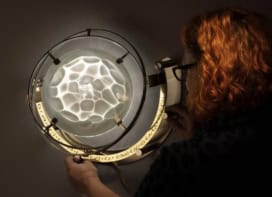Two of UK's most famous physicists - Joseph Rotblat and Stephen Hawking - have been given unique opportunities to express their personal opinions to the public. Next year Hawking will unveil 10 photographs of what he believes are the most abiding images of the 20th Century for the National Portrait Galley in London. Meanwhile Rotblat has appeared on Desert Island Discs, one of the UK's most popular radio programmes.
Hawking was one of ten famous names asked by the National Portrait Galley to pick photographs that defined the 20th century. He was the only scientist in a group that included the film producer David Puttnam, the fashion designer Vivienne Westwood, and David Bowie. “I have concentrated on scientists and women, the important members of society, ” said Hawking, who revealed that one of his choices would be a photograph of Francis Crick and James Watson, the discoverers of the double helix.
In between choosing his favourite pieces of music for Desert Island Discs, Rotblat talked about how he learnt from a early age of the hardship caused by war. He was five when his family became destitute as a result of the First World War. These experiences convinced him that only science could improve poverty. In 1939 Rotblat received a scholarship to work with James Chadwick at Liverpool University while his wife remained in Poland. Despite frantic efforts to get her out of the country at the start of the Second World War, she was turned back at the Polish border and later died at Auschwitz. Rotblat was the only physicist to quit the Manhattan atomic bomb project during the war, and later went on to set up the Pugwash movement and receive the Nobel peace prize in 1995.
Rotblat said that his favourite record was Beethoven’s ‘Ode to Joy’, and that if he was allowed one book on a desert island it would be the CD-Rom version of the Encyclopaedia Britannica, along with a solar-powered portable computer. His other choices included “Where have all the flowers gone”, “Ol man river” and works by Chopin, Dukas and Bruch.


